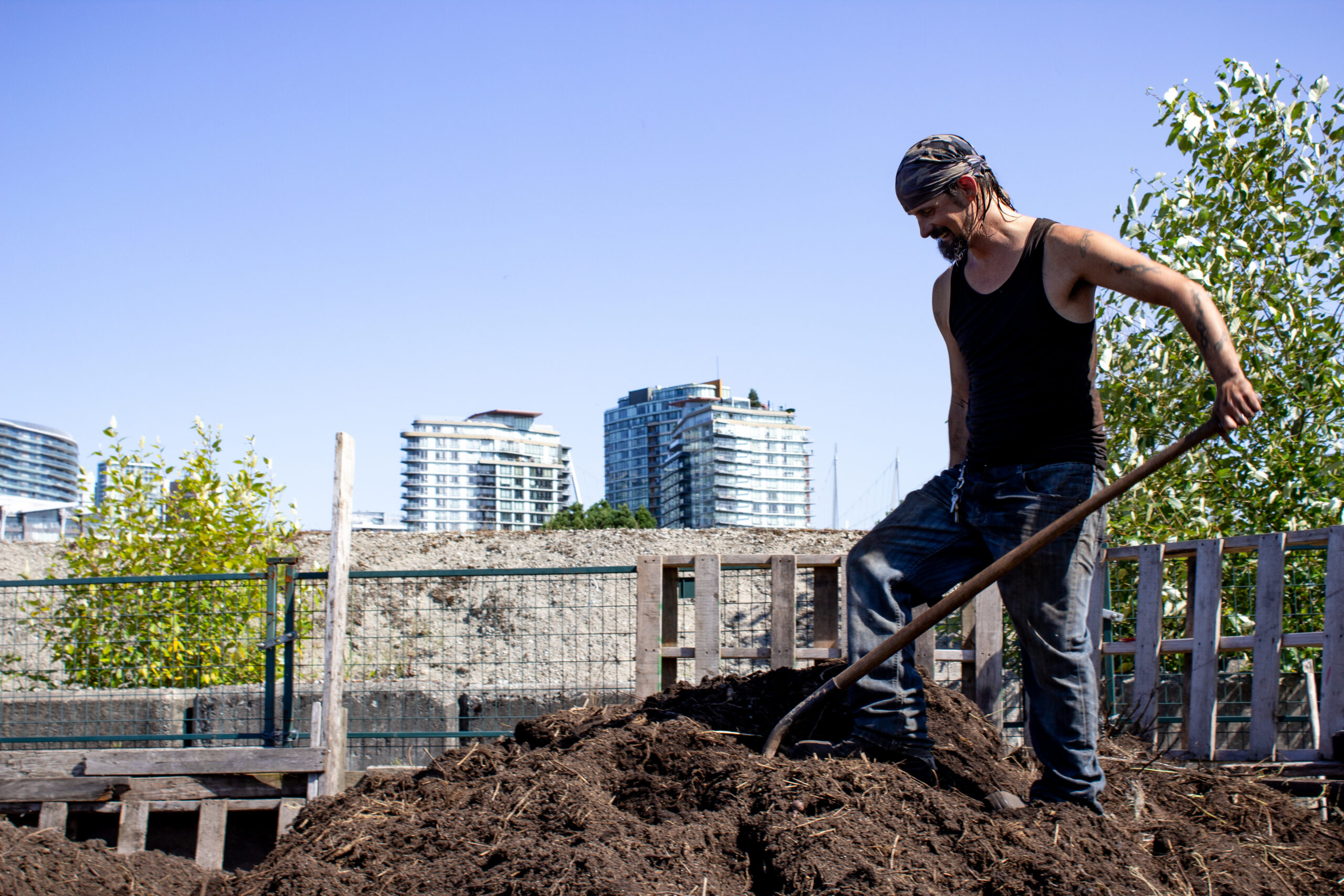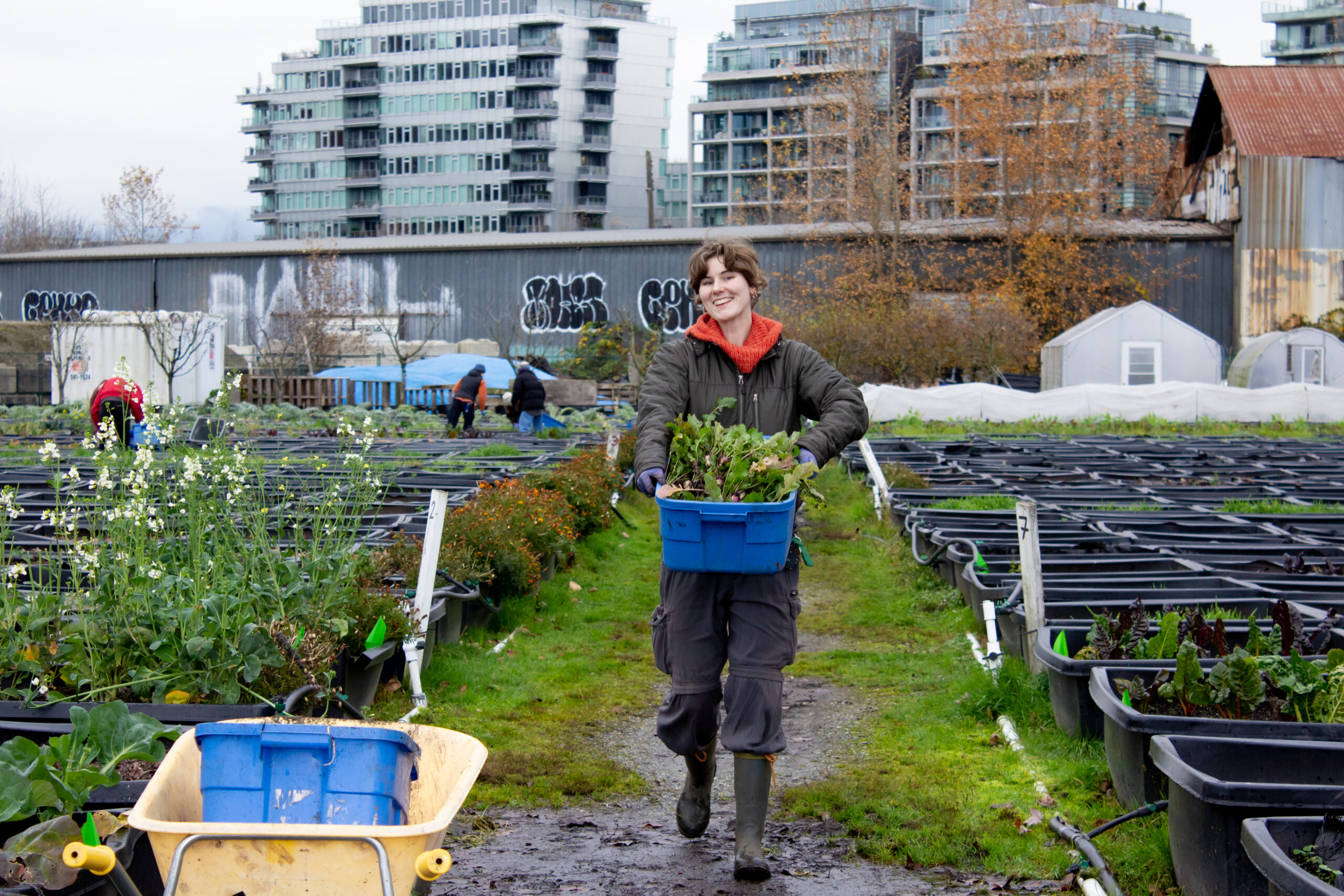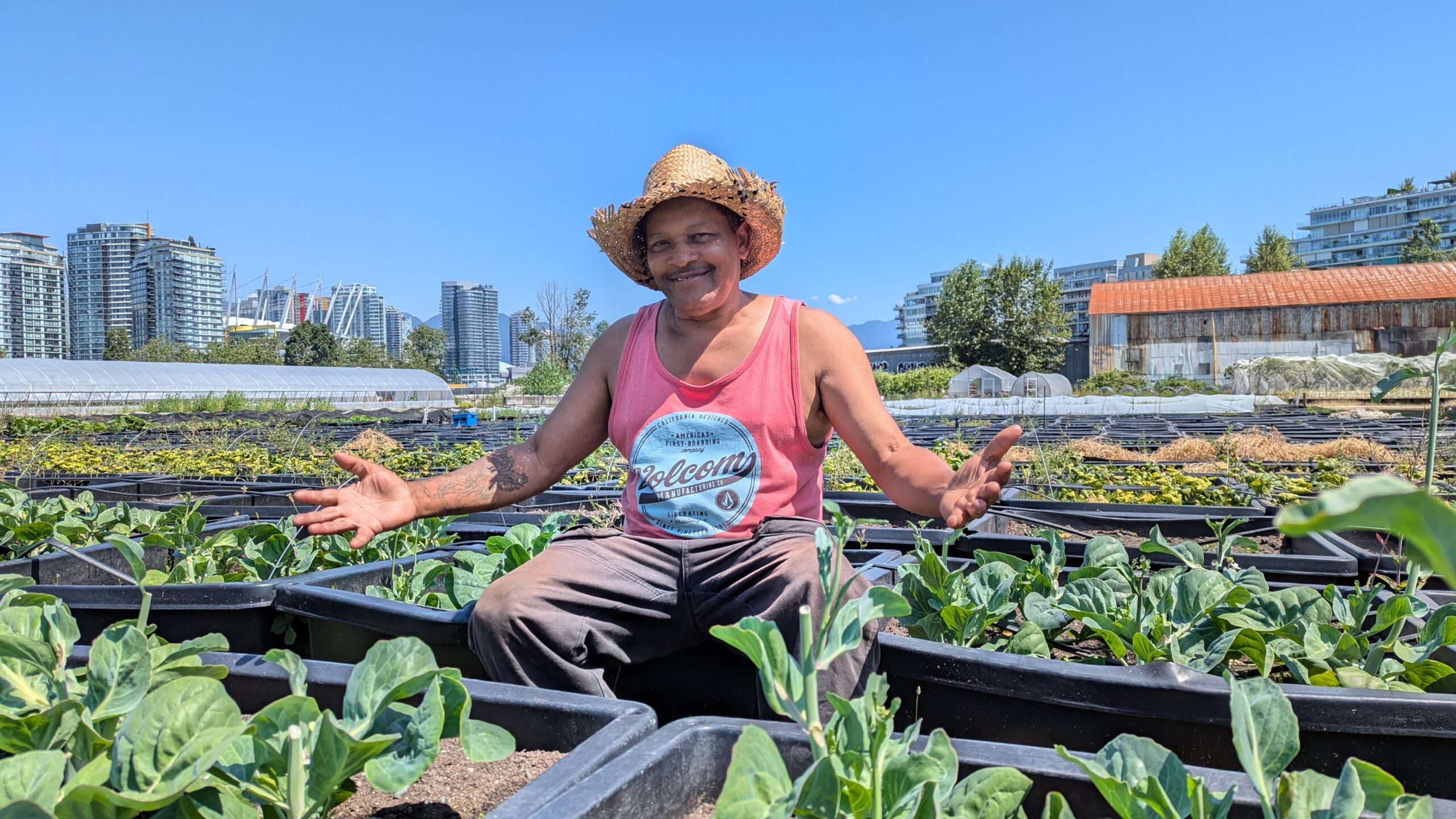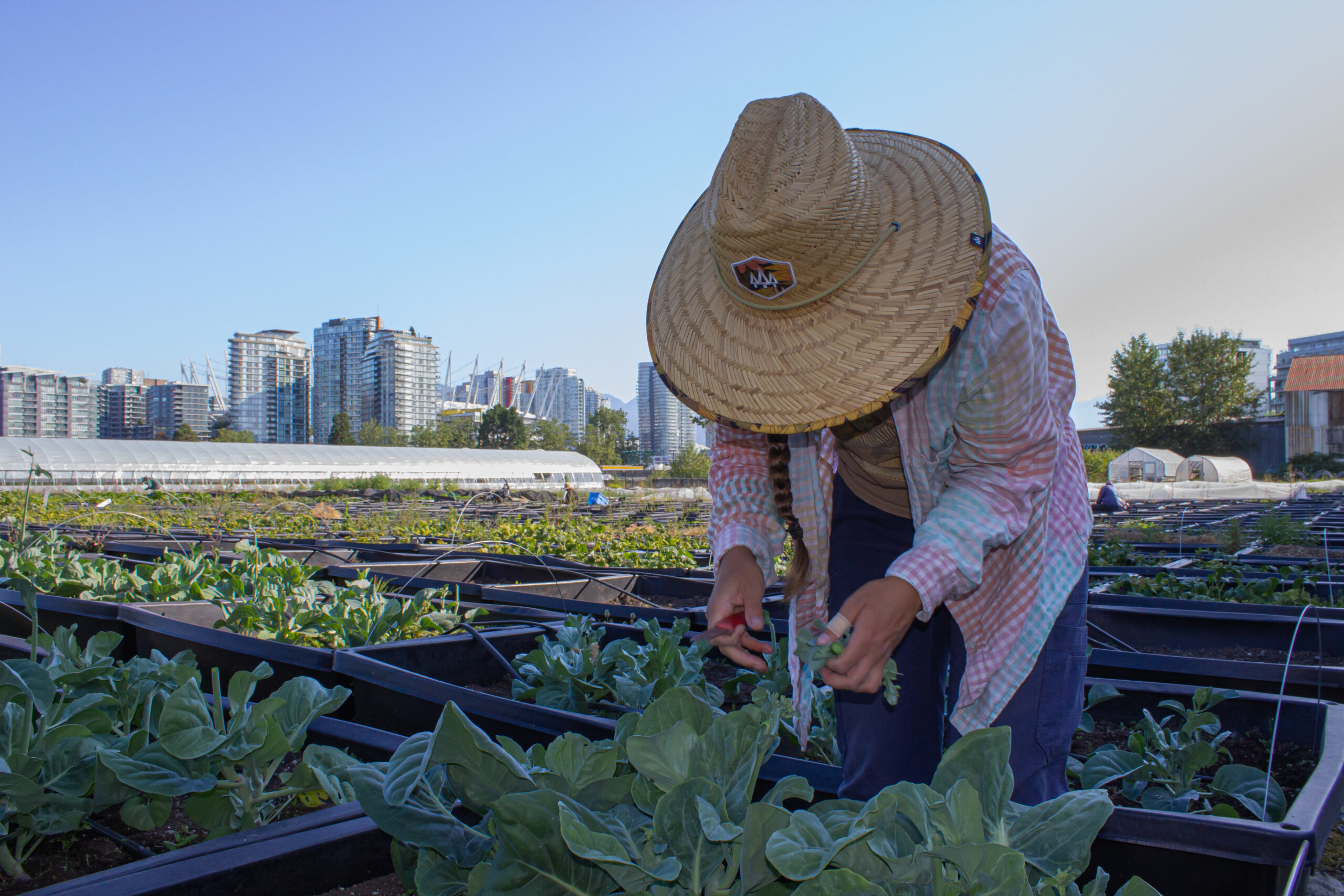When the patrons of the Downtown Eastside Neighbourhood House sit down to their free festive turkey dinner this year, some might be feasting on veggies they grew themselves. That’s thanks to Sole Food Street Farms, a nonprofit social initiative celebrating 15 years of providing “good food and good jobs” to residents of Vancouver’s Downtown Eastside.
“Every season we try to donate a third of what we produce,” says Kaum Kulatilake, Sole Food’s co-manager of community and administration. This includes regular donations to Saige Community Food Bank, Mom2Mom, A Better Life Foundation, and the DTES Neighbourhood House, which provides free weekly meals to Downtown Eastside residents facing food insecurity. The rest Sole Food sells through farmers markets and a community-supported agriculture (CSA) program—whereby customers subscribe to the season’s harvest and collect a weekly assortment of produce—as well as directly to restaurants.
This bounty is as local as local gets, thanks to Sole Food’s ingenious conversion of unused city lots into green and plentiful urban agricultural farms.
Founded in 2009 by Michael Ableman and Seann Dory, Sole Food provides low-barrier employment for individuals typically ostracized from the workforce, many of whom are unhoused, living with addiction, or grappling with mental illness. Very few have previous farming experience, but according to Kulatilake, Sole Food now has “career urban farmers” who have been farming with the nonprofit from its earliest days 15 years ago. “What Sole Food does best is depth of impact,” she says. “We employ people, and they’re there long-term.”
These days, Sole Food is like a well-nurtured rhizome, its impact spreading far beyond what peeks above the surface. The organization offers a supportive, inclusive environment in which to learn new skills and feel a new kind of connection to community and nourishment. “The depth of those connections is really impactful, and I think they create ripple effects in the community as well,” Kulatilake says. “Folks are dealing with some really hard things outside of work,” she explains, adding that part of being low barrier means that “some folks will come in late, and they’ll say, ‘Sorry I’m late,’ and my response always is, ‘No worries—glad you’re here.’”
This unconventional employment model acknowledges the realities of people’s lives, and while it can cause some staffing headaches, it’s designed to be resilient. In turn, the acceptance and lack of prejudice help build the resiliency of Sole Food’s employees. “Folks are valued for their contributions and their participation, and we don’t really ask about what’s going on outside of that unless they want to talk about it,” Kulatilake says. “We know everybody on an individual level and try to accommodate based on that.”

Sole Food also hosts regular staff workshops—typically once or twice a month. A recent three-part field cooking series saw staff turn fresh, seasonal food from the farm into “cheap and cheerful” one-portion meals using just a hot plate and affordable staples. “That was a really cool one,” Kulatilake enthuses, noting that they used a hot plate “to make sure that everybody could make what it was at home or wherever they were.”
This approach—meeting people where they’re at—is integral to everything Sole Food does, as is enthusiasm for urban farming. “I see a lot of passion from all of the farmers,” Kulatilake says. “Folks are so motivated,” she adds, joking that it’s her job to try to keep up with the farmers who show up to meetings with suggestions like “let’s try a little compost experiment over here.”
This can-do, experimental attitude has served Sole Food well. In the early days, Sole Food Street Farms was an incongruous verdant lot behind the Astoria Hotel in the heart of the Downtown Eastside. Later, it established an eye-catching urban orchard on Main Street at Terminal Avenue. Close to half a million SkyTrain riders could look out daily over the lush greenery of the one-acre plot, juxtaposed with the shining dome of Science World and the concrete jungle of one of Vancouver’s busiest thoroughfares.
These locations were only ever temporary, though, which would be a problem for most conventional farms. Sole Food’s founders had planned for this, however. “We’re definitely designed for moving,” says Kulatilake, with the farm built using raised planters that can be relocated using forklifts without uprooting plants in the middle of the growing season.
Over the past 15 years, she says, “we’ve been moving throughout the city and trying to stay close to the Downtown Eastside.” To support the nonprofit, the City of Vancouver offers private landowners a property tax break for leasing land to Sole Food.

“One of the things that has changed from 2009 to 2024 is that there is less vacant urban space,” Kulatilake explains. As various leases expired in 2019 and 2020, Sole Food brought together four disparate sites to create a single consolidated one. Under Sole Food’s tenancy, these vacant city lots flourished, producing more than a million pounds of fresh food.
The current site, a three-acre farm in Olympic Village at West 1st and Crowe Street, sits on land owned by the City of Vancouver. Sole Food leases it for a nominal fee, and while its tenancy is confirmed for next season, Kulatilake says Sole Food is working “closely with the city” on “a long-term, stable farming site,” adding, “We really hope that one day we’re baked into a zoning plan or something.” Despite all the moves, she is proud that Sole Food has achieved its “goal of long-term stable employment.”
Not just that, the enterprise has blossomed to become one of North America’s largest urban farms, producing around 30 tons of fresh food each year. Most of that is sold directly to restaurants, providing artisanal, heirloom varieties of tomatoes, spinach, beets, chard, and other fruits and vegetables.
“There’s such a difference between a summer fresh Sole Food tomato and a slice of beefsteak tomato in a burger in December,” says Chris West, executive chef at Medina Café. “The comparison between the two is crazy. It’s like one of the best things in the world to eat, compared to something I want to never eat again.”
West first learned about Sole Food while working at Homer Street Cafe, which remains one of over 50 restaurants the urban farm supplies.
“When I moved to Medina, one of the first things I did was to get us connected with Sole Food,” West says. “There are things Sole Food grows out of the local suppliers I work with where Sole Food is just growing the best of a certain product.”
These days, Medina Café is one of Sole Food’s biggest restaurant partners. “It makes me feel good to know that we buy the most,” West says, smiling. “I’m just one person, and we are just one restaurant, but it’s nice to think that we can make a bit of a positive difference in the local food landscape.”
As well as supplying restaurant partners, this year Sole Food made its CSA more accessible, with options to pay up front or on a schedule, and with a choice of a full-, half-, or quarter-share. The CSA was also available in four pricing tiers, ranging from a lower-cost Community Share to a Contributor Share that helps fund the lower-cost options.
“The flexible CSA pricing model worked really well this season. It was really lovely to see people purchasing Solidarity Shares so that others in the community could access the CSA,” Kulatilake says, adding that Sole Food plans to offer the tiered pricing option again next season. “Folks are wanting to make sure that their dollar gets stretched out, and all of the support that folks have given us for the CSA or the market is really, really valuable to us. Because the cost of running an urban farm has increased,” she notes.
West also keys into the cost of food, saying, “If people can pay a little more for food, and I know not everyone can, I think it’s so worth it.” He observes, “You always pay for food one way or another. Either through the exploitation of the providers, through your health, or through your bank account. If you are able to, the third is always the best option.”

Farmworker exploitation certainly isn’t on the menu at Medina Café or Sole Food. In addition to agricultural training, Sole Food also provides breakfast and rain gear for staff when they need them, and offers other opportunities and supports.
“We had some really cool workshops this season,” Kulatilake says, going on to detail a plant dye workshop and another about pest management with the snappy title Kiss and Kill. This summer, the team also hosted an occupational therapist who talked to the farm workers about farming physiology and gave safety recommendations specific to urban farming.
These workshops teach valuable skills and strengthen connections. This includes fostering intergenerational community, with Sole Food’s staff covering a wide age range. As well as supporting senior farmers over the age of 65, this year the farm established a program to provide new opportunities for at-risk youth aged 19 to 30.
As any farmer knows, every season brings new possibilities for growth. For Sole Food Street Farms, its 15th year sees the retirement of its founder and executive director, Michael Ableman. Formerly the program director at Sole Food, Heather Farmer stepped into the role as ED, where she’s already supported the farm managers in a new endeavour.
“This year, we planted asparagus, Kulatilake says. “It doesn’t really produce for two years, but then it can produce for 15 years after that. It’s kind of a symbolic plant where, even though we’re mobile and all these different things, we’re promising we’ll be around to take care of this asparagus—and our people—for the next 15 years and beyond.”









